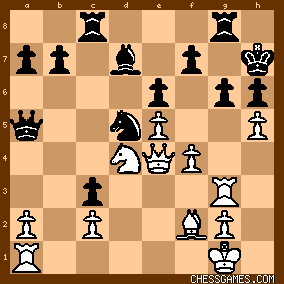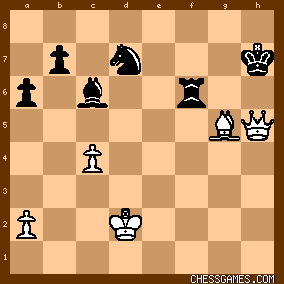|
< Earlier Kibitzing · PAGE 2 OF 3 ·
Later Kibitzing> |
| Dec-20-04 | | ughaibu: Calli: I suppose I meant "why he didn't resign after move 51". Capablanca had an overall negative score with the French according to this database. |
|
| Dec-20-04 | | Whitehat1963: Opening of the day featured in this game -- the one loss in Capa's celebrated 10 years of dominance over world chess. |
|
| Jun-21-08 | | RandomVisitor: 23...Rc4 might be better. |
|
| Jun-21-08 | | RandomVisitor: 23...Rc7 might be an improvement for Black. Who knows - it might have been good enough to extend Capablanca's winning streak. Position after 23.h5.

click for larger view Rybka2.3.2a <21-ply> 1. (-0.42): 23...Rc7 24.hxg6+ Rxg6 25.a3 Ne7 26.Kh2 Qa4 27.Qd3 Qc4 28.Qe3 Nd5 29.Qe4 Bc6 30.Qf3 |
|
| Jun-21-08 | | RandomVisitor: <Whitehat1963>Rybka sees the next few moves as 23.a4 Rc4 24.h5 Rxa4 and scores the initial position -0.82/17. |
|
| Jun-21-08 | | Whitehat1963: <RV>, what does Rybka think of 23. a4 and 51. Qe8+? |
|
| Jun-22-08 | | RandomVisitor: <whitehat1963>51.Qe8+ should win for white after 51...Nf8 52.Qe5 Ng6 53.Qb8+. |
|
| Aug-18-09 | | WhiteRook48: 51 Qxg4 is inferior |
|
| Aug-31-09 | | WhiteRook48: upset!!! |
|
| Feb-26-10 | | newzild: A great win by Chajes.
I have to say I fully sympathise with Capablanca's desire to play on in this position. In my opinion, far too many games end with premature draws and resignations. This is perhaps the most famous example:
R Byrne vs Fischer, 1963 |
|
| Feb-26-10 | | Once: I am developing a bit of a liking for games with "unusual" material imbalances, such as queen against rook and minor piece or rook versus connected passed pawns. All too often us amateurs hate to lose material or make uneven trades, so we don't get into these kinds of positions as often as we probably should. Capa is one of my heroes, but you have to admit that Chajes played well here. As to whether Capa should have resigned earlier, I don't think so. There were ways for Chajes to go wrong and where there is life there is hope. My general rule of thumb about resignation is that if I am winning, my opponent should resign early so I can get home at a reasonable hour (usually from some dismal church hall in the middle of rural nowhere). But if my opponent is winning, I will play on until there is absolutely no chance of scraping a win or draw :-). |
|
| Feb-26-10 | | Morten: Capablanca probably had a hard time accepting defeat against other than world champion level players. Another example is the game against Sämisch at Karlsbad 1929. Capa simply blundered in the opening and dropped a piece. But he played on to the bitter end - and actually came close to having chances of saving the game. |
|
| Feb-26-10 | | RandomVisitor: After 24.Rh3, black had a good move and a strong advantage, that was overlooked:
click for larger view Rybka 3:
<[-0.71] d=20 24...Ne7> 25.Qf3 gxh5 26.Rxh5 |
|
| Feb-26-10 | | Garech: Awesome game! |
|
| Feb-26-10 | | AnalyzeThis: <RandomVisitor: After 24.Rh3, black had a good move and a strong advantage, that was overlooked: 24.... Ne7 > Very interesting. I did have the impression that Capa could have beaten this attack off. |
|
Feb-26-10
 | | Jimfromprovidence: It appears 51 Qxg4+ wins easily, forcing the exchange of rook for bishop. For example, 51...Kh7 52 Qh5 Rxf6 53 Bg5+.

click for larger viewOr 51...Kh8 52 Bg7+ Kg8 53 Qh5, etc.

click for larger viewWhite ends up ahead a queen vs. the loss of a bishop and a knight. |
|
| Feb-26-10 | | whiteshark: Don't mess with Chajes. |
|
| Feb-26-10 | | WhiteRook48: OMG that is the worst pun i have ever heard |
|
| Feb-26-10 | | hstevens129: What's up with 6...Bxc3 ? Seems like it just strengthens White's center. Would love to hear someone's opinion on that. |
|
| Feb-26-10 | | hstevens129: 8.Qg4! is really great [8...0-0? 9.Bxh6]. Black will now not only be incapable of castling, his King-side Rook is going to have a hard time getting out of there. |
|
Feb-27-10
 | | Phony Benoni: <hstevens> After 6.Bd2:

click for larger view...Bxc3 is Black's usual move here, as it allows him to move his attacked knight to e4 on the next move. If 6...Ne4 immediately, then 7.Nxe4 wins a piece (7...dxe4 8.Bxb4, or 7...Bxd2+ 8.Nxd2). If black doesn't play 6...Bxc3, his knight must go to d7 or g8, and in either case 7.Qg4 has worked much better than in the game. Have you tried the Opening Explorer yet? Go to here: Opening Explorer
You'll see that 6...Bxc3 has yielded good results for White, but 6...Nfd7 has given White overwhelming results. Also 6...Bxc3 has been played 40 times as much as 6...Nfd7. Now, you can't use these statistics as "proof", but they do indicate that the vast majority of master players feel Black gets better chances with the knight in more active play on e4. If you feel differently, just study the games, develop some ideas on playing the resulting positions, then go out and shock the world! It won't be the first time established theory has been turned on its head. |
|
| Mar-01-10 | | kevin86: normally,this ending is a very hard win-especially since it involvwa one of the best ever. Here,it's child's play (without Chuckie). |
|
| Dec-18-11 | | fetonzio: Rxh6 is quite beautiful |
|
| Nov-29-15 | | kereru: After the sac/blunder 24...f5? Black's initiative doesn't give him enough for the Queen. 29...Bc6 (given by Capa) is only slightly more accurate than 29...Rcg8; the plan he gives (30.g3 Kh5, followed by 31..Kg4 and 32...Rh8) is too slow and White has time to defend. At best he can draw a worse endgame. |
|
Feb-23-16
 | | wwall: Do you put the start date or the end date of a game here? Round 2 of the finals started on Feb 7, 1916. Capablanca adjourned his game on move 54. The game was resumed on February 10. Capa played 12 more moves after the adjourned position before resigning. By the way, Chajes was not supposed to play in the finals, reserved for the top 4 players in the main tournament. He did not qualify. He ended up in 5th place behind Capa (scoring 11 wins and 2 draws), Janowski, Kostic, and Kupchik. But the players agreed to allow Chajes to play. Capa would have had a longer winning record if Chajes had not been allowed to play. |
|
 |
 |
|
< Earlier Kibitzing · PAGE 2 OF 3 ·
Later Kibitzing> |





